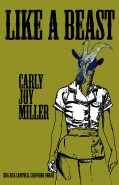
Book Review: Like a Beast by Carly Joy Miller
Reviewed by Tyler Robert Sheldon
Like a Beast
Poetry by Carly Joy Miller
Anhinga Press, June 2017
$10.00, 28 pp.
Above all, Carly Joy Miller’s new chapbook Like a Beast, winner of the 2016 Rick Campbell Chapbook Award, hinges on a troubled search for identity and belonging, and on the ramifications of submitting to our hidden impulses. Sex, violence, and the need for emotional understanding become ritualized. The opening poem, “Nightshift as a Waitress,” invites the reader into this dark world through a juxtaposition between common and taboo interactions. “I sucked in twenty / lemons to pucker // my mouth shut,” the narrator confides, “yet I’ll whistle / you the proper / order: powdered // sugar on the flapjacks.” Deeper desires are not so openly revealed. “I look like milk in the dark,” the speaker whispers, “and you have minutes left / to get me to wail the best blues // of our weekly undoing.”
Miller’s skilled employment of sound heightens the tension strung through so many of these poems. In the sparsely phrased “Nightshift as Horsebride,” the speaker’s transformation is implied through a relationship. “I barefoot toward my lover / turned groom // turned handler,” the speaker says, granting a partial visual: “The milked-out stars / swoon at my flank, / hiplatched / gate swinging.” Alliteration and rhyme in particular are plentiful, as they echo the poem’s sensual narrative.
This attention to efficient language peaks in “Midshift Contemplating Desire,” perhaps the chapbook’s most economically phrased poem. In two lines, the poem easily communicates worlds of emotion. The second line is a powerful summation of darker, often unspoken wants: “my hands worship what is riddled in flesh.” This body-as-temple image, echoed in later poems, suggests layers of meaning hidden within the body itself—perhaps instilled by the narrator, who makes her own meaning. We create our own signifiers, she suggests, and define the world entirely through semiotics. Desire, like so many other emotions, is also this slow reveal of hitherto unknown thought.
Toward the end of Like a Beast, Miller’s speaker searches for identity in the self. “Dayshift as Girl with a Pearl Earring, Smeared in Ocher” is an excellent example of this exploration. The poem’s questions are existential: “Pardon me, onlooker, / but where are my bones?” the narrator asks. Casual on the surface, the speaker is elementally troubled, and surmises, “Perhaps there is no end to me. / When something dies, / it’s always in the walls.” Though this abstracted immortality is a small comfort, the narrator needs verification of immediate importance, and pleads again with the reader. “Onlooker,” the speaker implores, “point toward the latticework / of my face. Tell me its luster.” The narrator hides beneath a sheen that smothers despite its beauty. Finding oneself becomes, unexpectedly, the speaker’s most difficult task.
Identity is realized ultimately in the company of another. “Dayshift as Yours” reveals this epiphanic moment through action: “You strip / my neck of its brocade,” the speaker recounts. Without the obscuring lenses grappled with throughout this chapbook, the narrator is at peace: “Goodbye / non-miraculous exterior: / I’m half myself again.” The complete transformation will come in time, but for the moment the speaker wishes the reader to change as well, intoning, “You, / celebrant, open.” After braving (with the narrator) the turmoil and dark impulses throughout Like a Beast, revealing ourselves seems only natural and right.
Tyler Robert Sheldon is the author most recently of Driving Together (Meadowlark Books, 2018) and Traumas (Yellow Flag Press, 2017). His poetry and reviews have appeared or are forthcoming in The Los Angeles Review, The Midwest Quarterly, Quiddity International Literary Journal, Coal City Review, The Prairie Journal of Canadian Literature, Tinderbox Poetry Journal, and other venues. He’s been nominated for a Pushcart Prize, holds a BA and an MA in English from Emporia State University, and is an MFA candidate at McNeese State University.


[…] your commitment to the chapbook writing community. I buy other poets’ chapbooks, and I often review them. I also love to read manuscripts in progress and have been lucky enough to do that […]